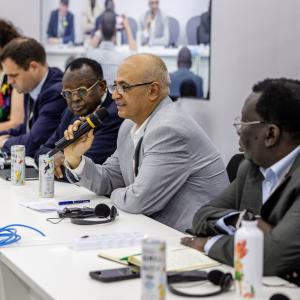Fragile states at COP30: we are being 'locked out' of climate finance
Network of conflict-affected countries urges COP30 to fix a climate finance system that leaves the world’s most vulnerable behind.
While the ambition to unlock an additional $1.3 trillion in Belem is admirable, we need to see equal ambition in ensuring that existing funds reach the people who need it most”
BELéM, BRAZIL, November 14, 2025 /EINPresswire.com/ -- COP30 President André Corrêa do Lago has said this year’s conference must put “people at the centre” of climate action. But a network of fragile states says more than one billion of the world’s most at-risk people are still being left out of the conversation.— Mauricio Vazquez
In a statement released on Tuesday, the Improved and Equitable Access to Climate Finance Network said that countries affected by conflict and fragility are being “locked out” of funding to adapt to climate impacts.
The Network – which is made up of 10 countries affected by fragile governance and conflict, including Burundi, Mauritania, Somalia and Papua New Guinea – is calling for climate funds and COP30 to do more to address “this urgent blind spot at the heart of climate finance.”
A CONFLICT BLIND SPOT IN CLIMATE FINANCE
More than one billion people live in countries affected by conflict, violence and fragile governance. Yet in 2022 these countries received just 10% of global climate finance, despite being some of the most vulnerable to climate impacts.
Countries face several issues in accessing finance, including long timeframes and demanding application requirements. According to Yemen’s minister or water and environment, Tawfiq Al-Sharjabi, speaking at a UNFCCC side event on Tuesday: “Complex procedures, limited technical capacities, and the absence of flexible financial instruments – all these things constrain our ability to secure climate finance.”
As a result, it can often be easier for countries to access humanitarian aid than climate finance, according to Somalia’s minister of environment and climate change, Bashir Mohamed Jama. “Somalia receives just over $300 million in climate-related funding each year, or less than 1% percent of the amount we need to adapt”, Jama said. “By contrast, each year Somalia receives $1.1 billion in humanitarian aid funding.”
Jama said this discrepancy highlights “a damning failure at the heart of the global development system: it is easier to unlock finance in the aftermath of disasters than it is to invest in preventing them.”
Negotiations at COP30 to increase climate finance flows only lend fresh urgency to the issue. “While the ambition to unlock an additional $1.3 trillion in Belem is admirable, we need to see equal ambition in ensuring that existing funds reach the people who need it most”, said Mauricio Vazquez, head of policy for risks and resilience at think tank ODI Global.
A GROWING PUSH FOR CHANGE
The Improved and Equitable Access to Climate Finance Network was formed in 2024 to call for more attention to the blind spot in climate finance.
On Tuesday, three new members joined the Network: Mauritania, Papua New Guinea and South Sudan.
In its statement, the Network calls for climate funds and development banks to continue reforming how they allocate climate finance, to make sure it reaches people in places affected by conflict and humanitarian crisis. The Network is also pushing for funding to be spent on long-term projects which build countries' climate resilience, rather than support in the aftermath of disasters.
THE STAKES ARE HIGH
Climate adaptation is high on the agenda at COP30. In Belém, governments will seek to finalise a comprehensive set of indicators for the Global Goal on Adaptation – a collective commitment within the UNFCCC to define and track how the world strengthens resilience and reduces climate vulnerability.
But experts say that unless more is done to include fragile and conflict-affected countries, climate change impacts will only continue to worsen lives, livelihoods and entire economies for the furthest behind. “We see the impacts of these linkages [between climate change and conflict] first-hand,” said Asif R. Khan, director of the policy and mediation division within the UN Department of Political and Peacebuilding Affairs, which currently chairs the Climate Security Mechanism.
Most of the UN’s peace operations are deployed in climate-stressed regions that are among the least equipped to manage climate shocks. Khan said: “Climate change is amplifying the pressures that fuel conflict and displacement. For example, lack of access to water has accentuated tensions between herder and more sedentary communities in parts of West Africa.”
The most effective way to support fragile countries is to make them more stable and peaceful. Khan said: “For us, helping countries manage climate risks is part of a broader effort to prevent crisis. And that means more than planting trees or installing solar panels. It’s also involving all parts of society to pull in the same direction to build resilience and foster peace. That also means, in turn, joined-up risk analysis, sustained partnerships, and financing that reflects realities on the ground”.
This emphasis on collaboration – across peacebuilding, development and climate adaptation – is also a focus of several donor governments. Neale Richmond, Ireland’s Minister of State at the Department of Foreign Affairs, said: “Ireland’s international development policy is centred on reaching the furthest behind first. Adopting a comprehensive and inclusive approach that prioritises peace and reduces humanitarian needs, we recognise the need to forge a future where peace and security thrive alongside a sustainable and resilient planet.”
Charlotte King
ODI Global
c.king@odi.org
Visit us on social media:
LinkedIn
Legal Disclaimer:
EIN Presswire provides this news content "as is" without warranty of any kind. We do not accept any responsibility or liability for the accuracy, content, images, videos, licenses, completeness, legality, or reliability of the information contained in this article. If you have any complaints or copyright issues related to this article, kindly contact the author above.

